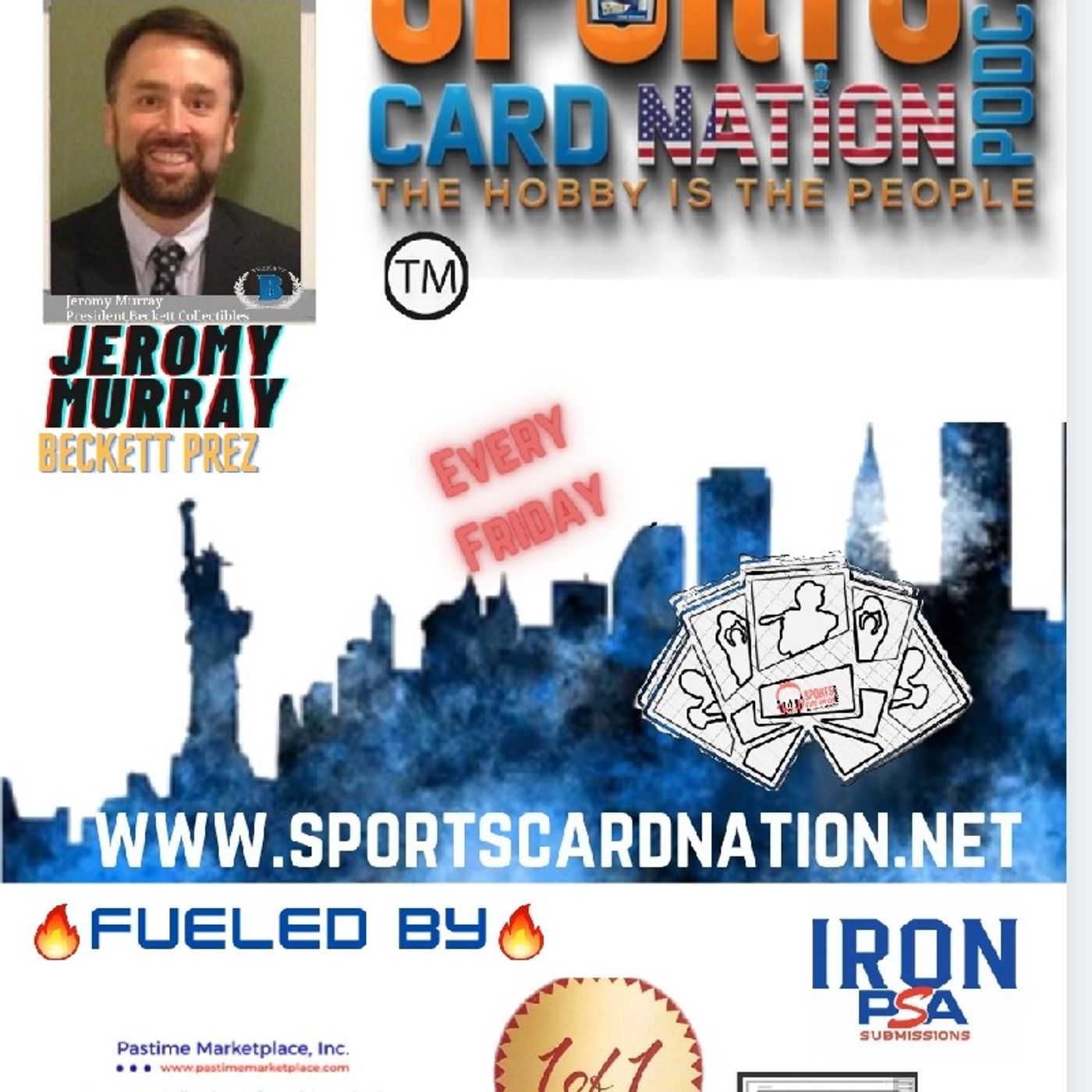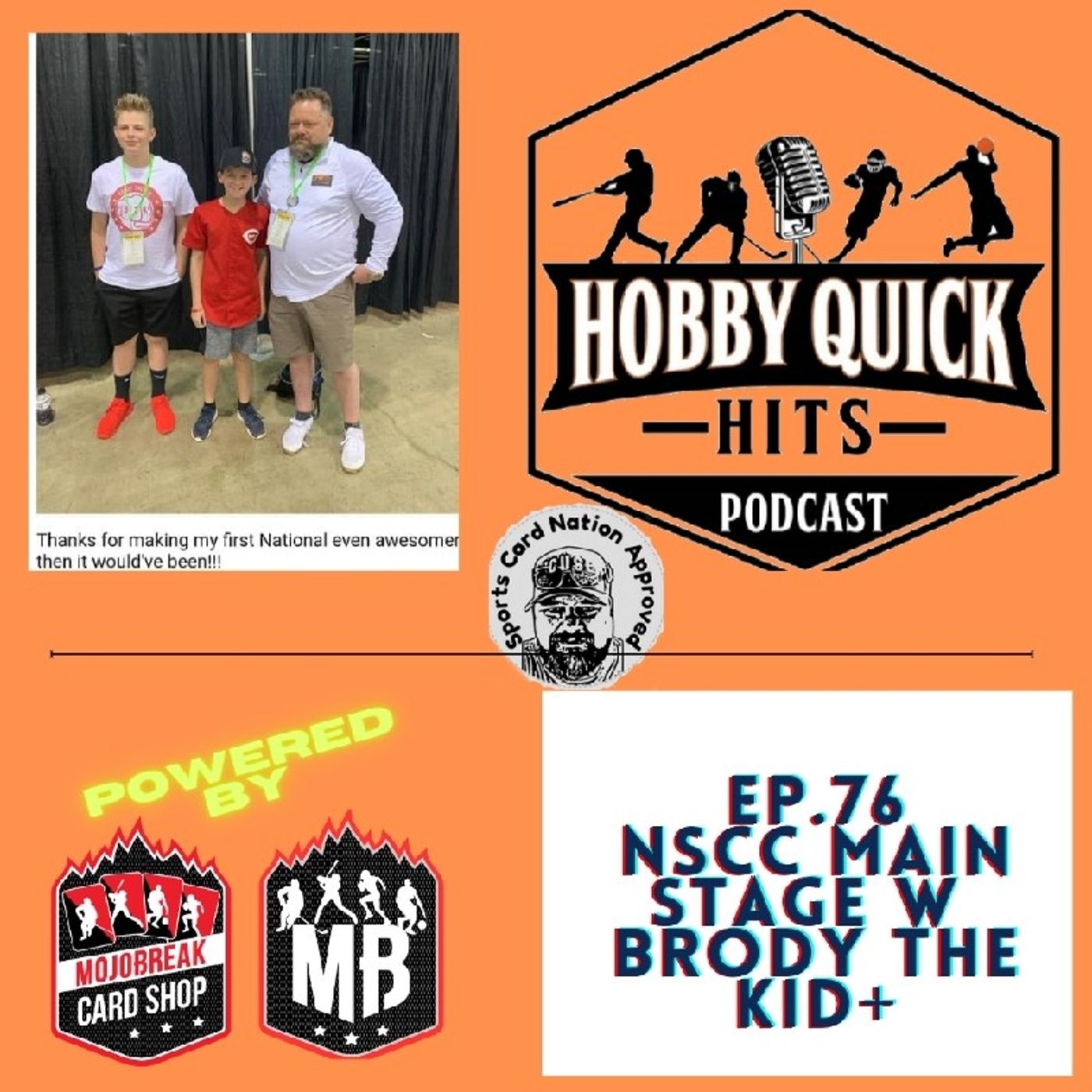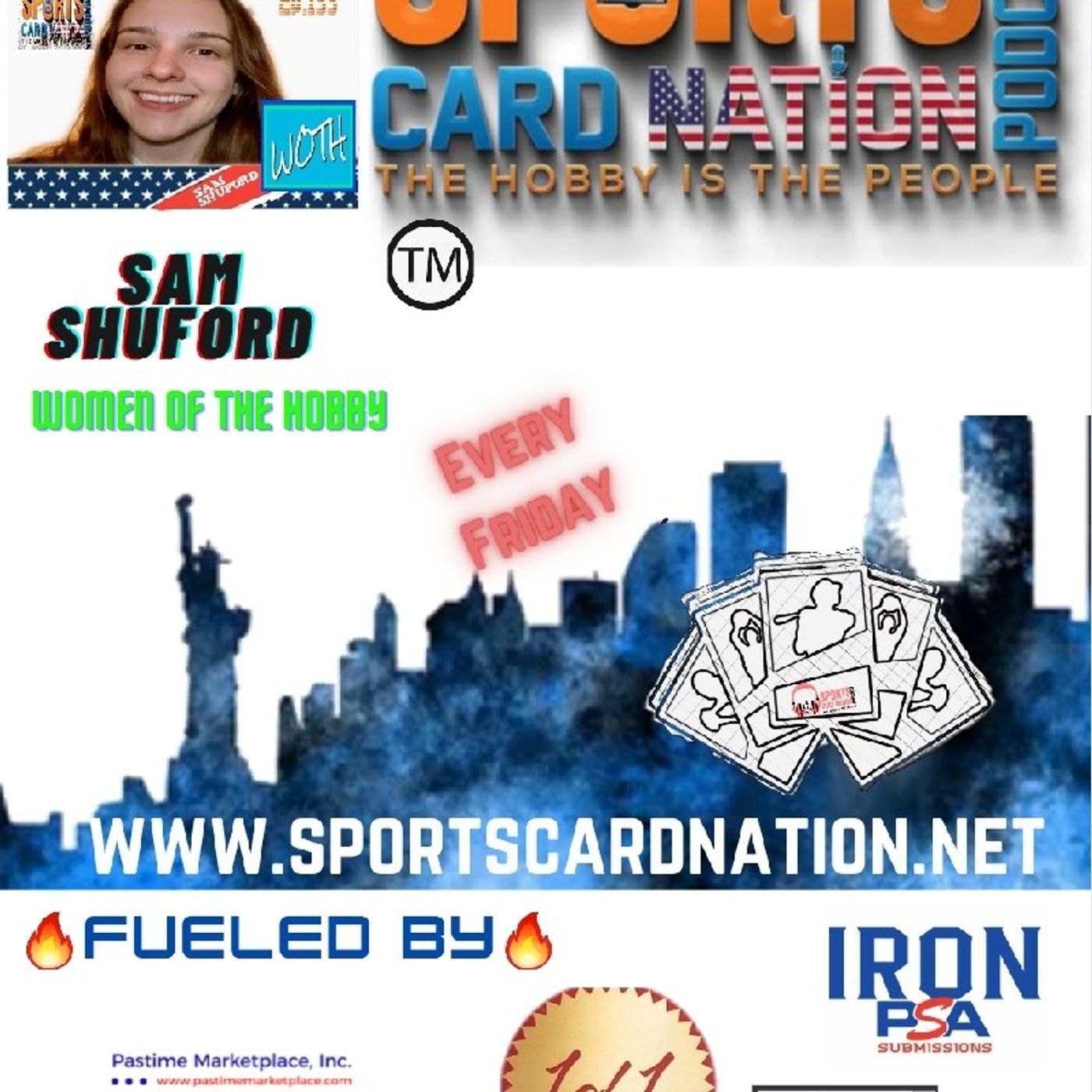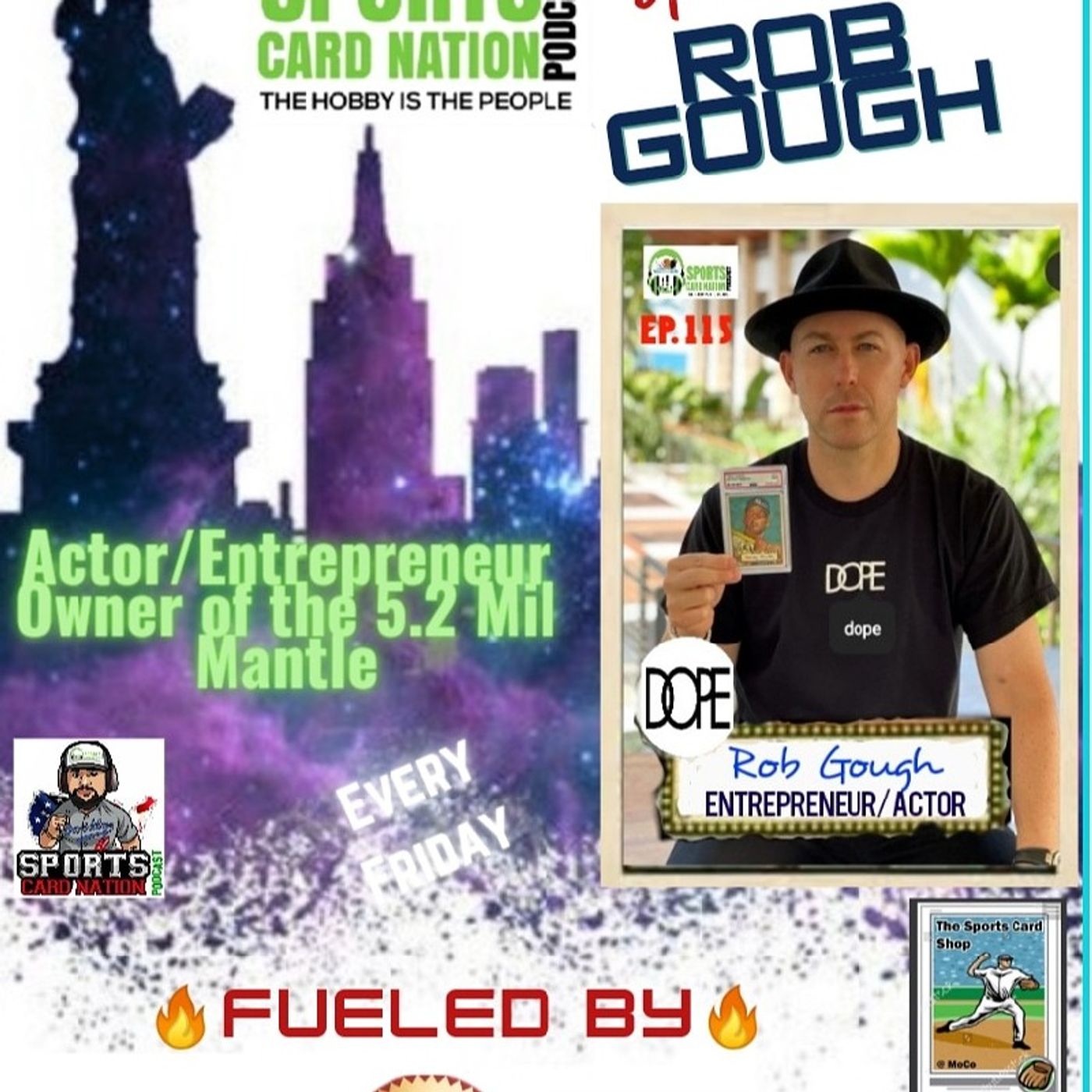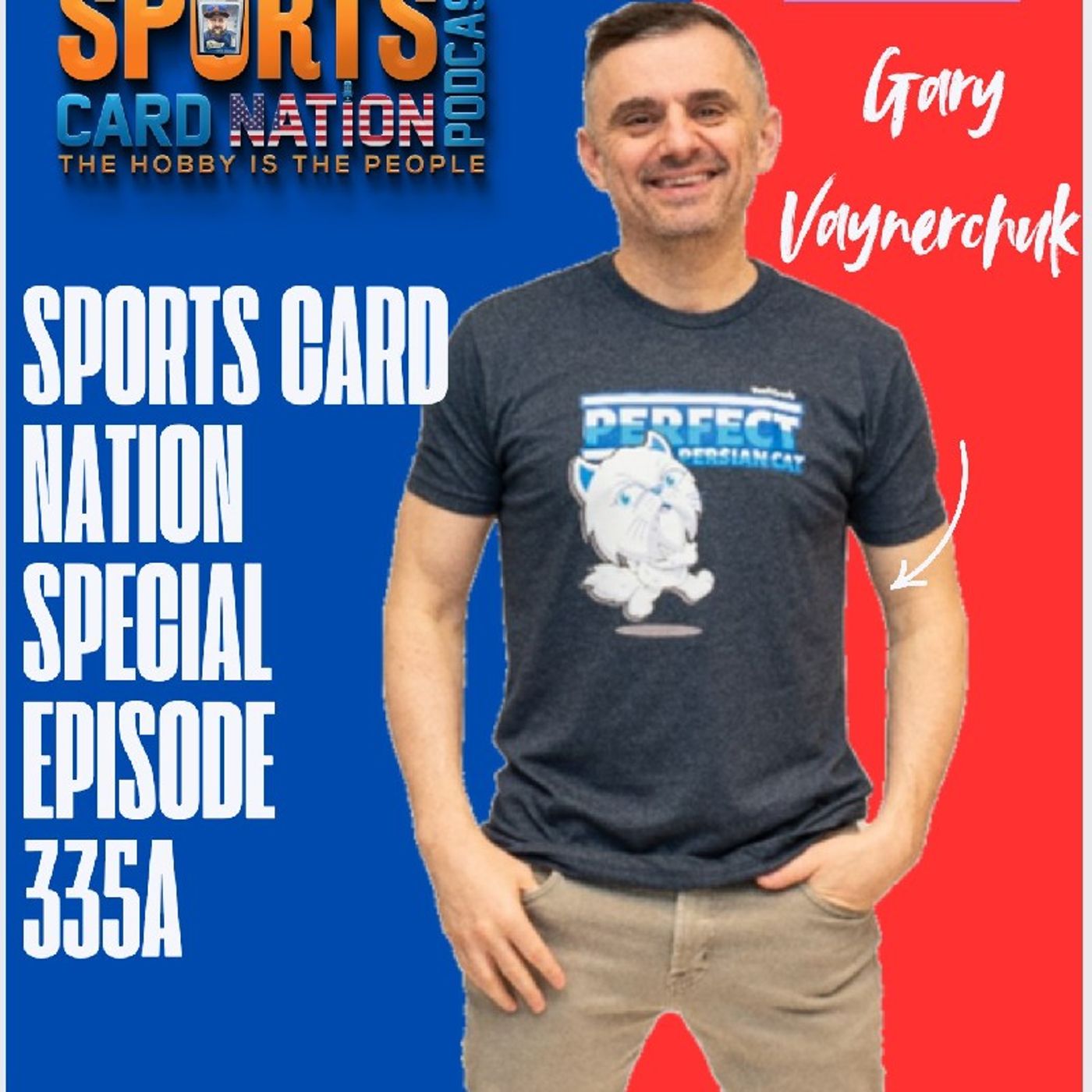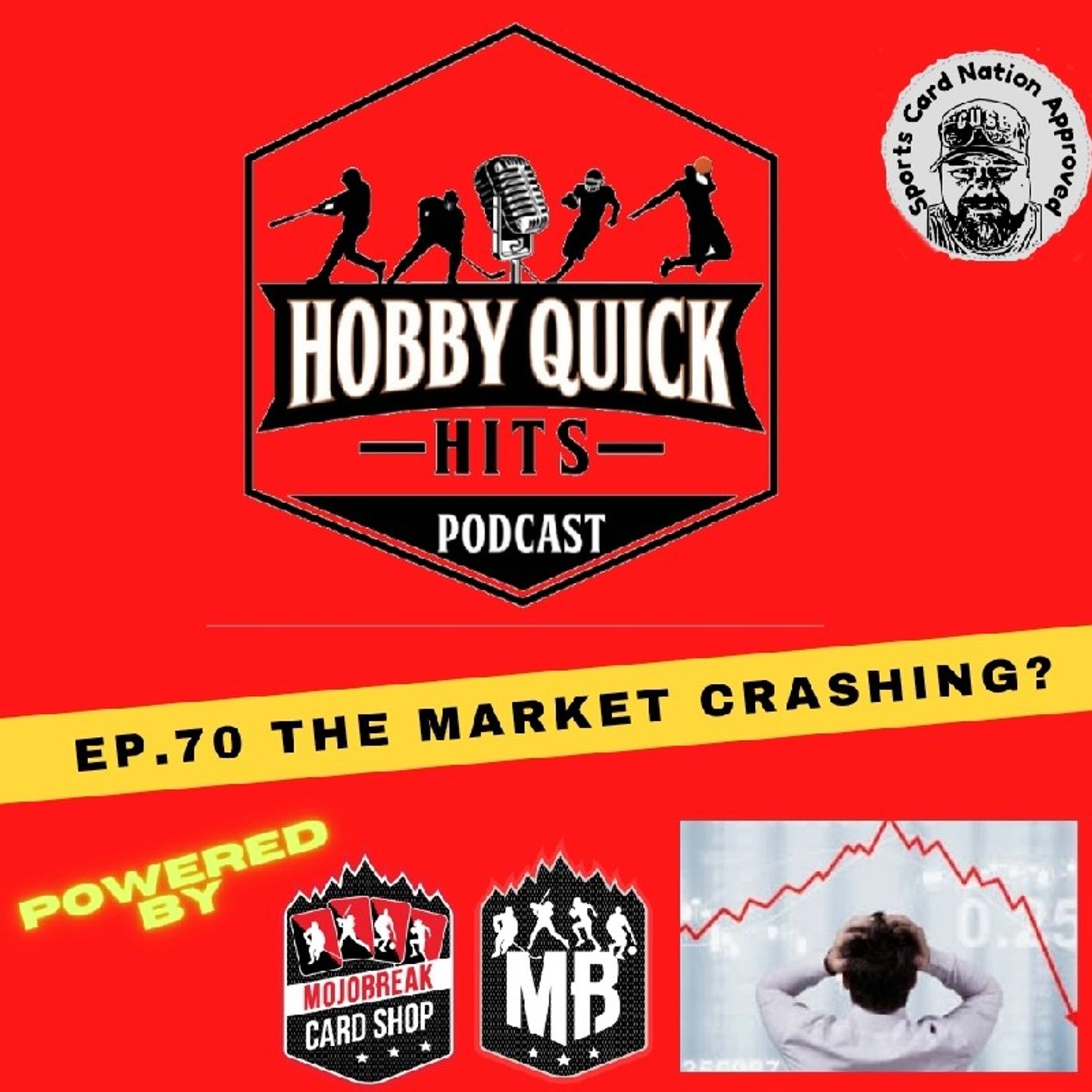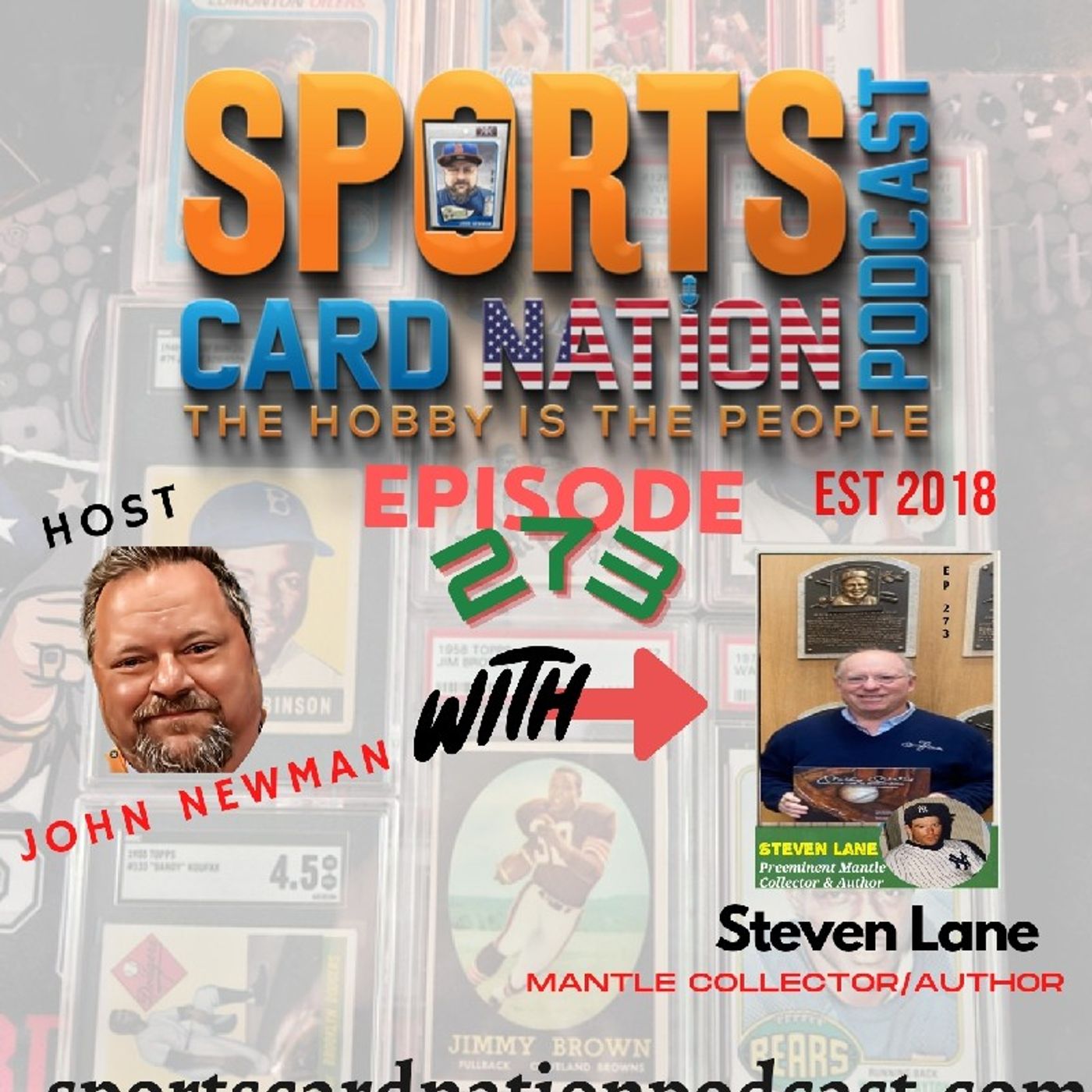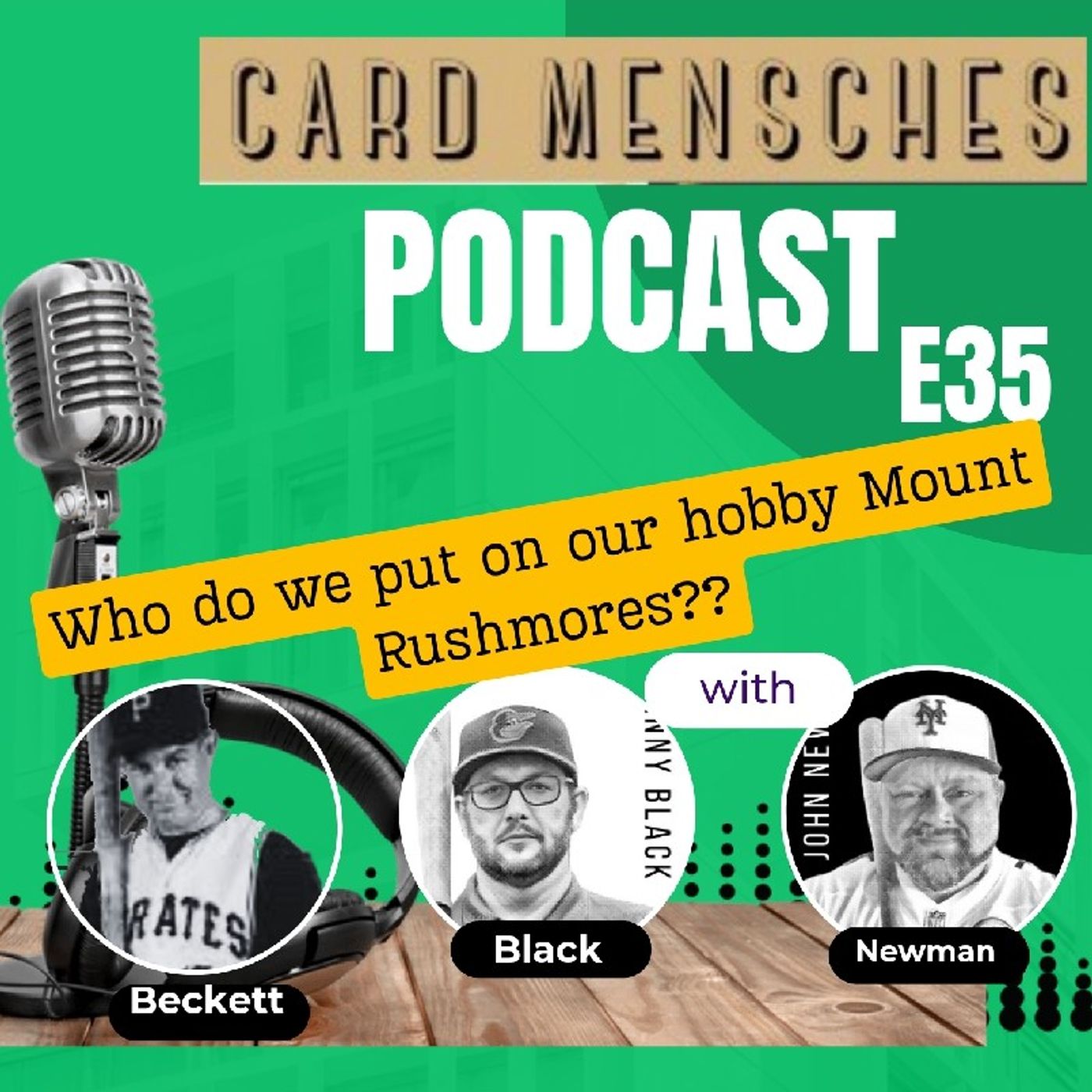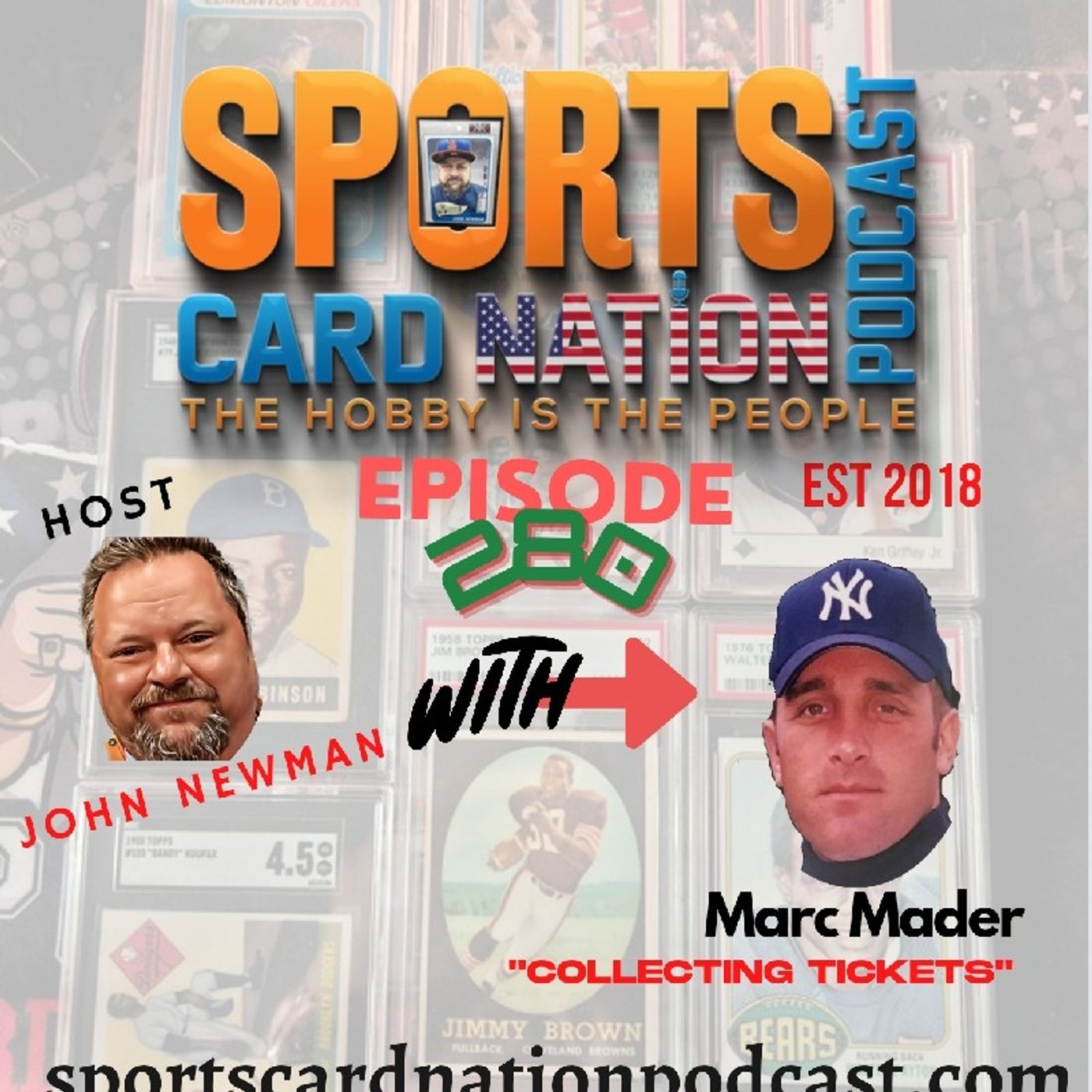Drake McGruder "Collecting on multiple levels" E339
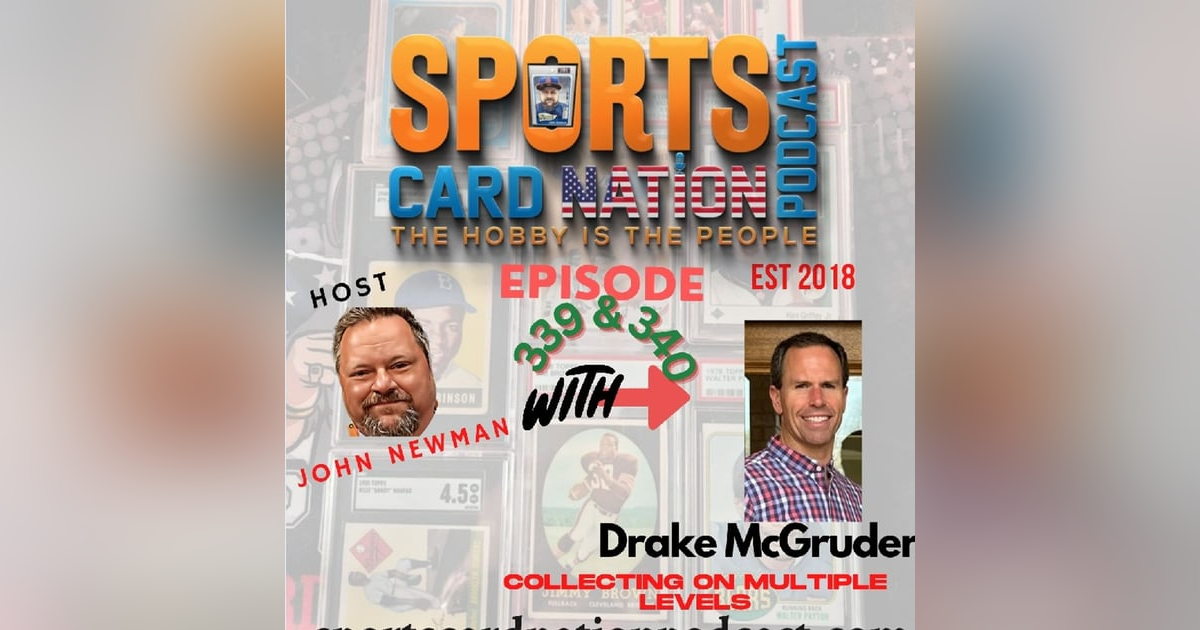
Drake McGruder is a tremendous ambassador for the hobby and we're happy to have him as our guest this week.
Talking points on this episode may include:
*how it started/Memphis roots
*The underratedness of Peyton Manning
*The allure of wrestling
*Shiny over vintage but room for both
*Hobby traveling
*Hobby and Wrestling Community closeness
*NSCC Discussion
Follow us on Social Media:
Website:
https://www.sportscardnationpo... .com
https://linktr.ee/Sportscardna...
Merch shop:
https://sports-card-nation.pri...
To eliminate pre & post-roll ads
https://www.spreaker.com/podca...
Sports Guard Nations, Hobbies, the People, weekly news and interviews. It's your number one song. Sports Garnation hobby is the People. Spawns guy Nation.
What is up? Everyone? Welcome to episode three point thirty nine of Sports Carnation Podcast. Have a guest today that I've been been on my list and always wanted to buy and just finally got around to asking him and talking to him, and so, uh, he's going to be on the show today, Drake McGruder and Drake a great hobby ambassador, Big Peyton Manning guy wrestling hails from Memphis, Tennessee. We're going to talk to him about his kind of hobby journey, collecting journey. Some national talk.
It's a great conversation and happy to have them on and hopefully be on this week and next week. And love that am on again because there were some things we didn't even cover that was on my list. So with that being said, we're gonna take a quick break and we'll be back with Drake and at Rhymes. And I didn't do that on purpose.
Iron Sports Cards is your number one source for all your PSA and other grading submissions. Their elite status improves turnaround times. Heck, they even provide the card savers. Their chat rooms provide updates on all your submissions.
They also offer wax options and single cards to cover all the bases. Check them out on Facebook at Iron Sportscards Group or on the web at Ironsportscards dot com, or even give them a call at one eight seven seven Iron PSA. Rob's got you covered. Real happy to be joined by my next guest here on sports Car as he's been on my list to get on the show.
And you know, since we went to two episodes like double episodes, we get less guests on each month, so it's it's taken me a little bit, that's on me, but glad to have them on. Mister Drake McGruder. Welcome to sports Cardination. Hey John, Thanks, thank you very much for having me on.
I'm a longtime listener, first time caller as they say in the radio business, so I've long been a fan of your show, and I'm excited to be on. Well, I appreciate the kind words and glad you here again, kind of you know, first time on. Hopefully not the only time on, and we'll have you back again, but. Being the first time on, it's kind of the standard fair opening question, Right, how did we get here? Where did it all start for young Drake to where we are now? But where did the hobby first start for you? Yeah? So when I was I don't know, five six years old, my aunt and just for background for the listeners, I grew up in the Memphis area, hence my love for wrestling, which we'll talk about in just a bit.
But uh so, my aunt for my birthday gifted me some of our old like sixties and seventies football and baseball cards and all that kind of stuff. And I didn't really know much about them. I just thought they were really cool photos. And then I would flip through and I would see some names of people that I knew, and I looked to read the back and all that, and I was like, well, this is kind of neat.
And she gave them to me and a binder, which I still have, by the way, I still have all the cards that she gave me, you know, and and that and just to say, that's the philosophy that I have if someone ever gives me a card, I'd never get right, like that's a gift and that whole sword. And so that was my first kind of experience into cards. But then growing up as a kid, you know, we had several hobby shops where I grew up, just outside of Memphis, and whenever you got good grades on your report card or you did good and whatever, that was kind of what my parents and some of my friend parents would do to recognize that that accomplishment. We would go to the hobby shop and either get some packs of cards or a box of cards, because back then, you know, you get a box of cards for fifty bucks or whatever, right, and yeah, exactly, And so we would bust through the cards and you would, you know, try to find the players, you like, I remember the early nineties, it was like everybody wanted you know, Chris Webber and Nick Van Exel and you know on the basketball side and that whole sort of stuff.
And then you'd trade with your friends, and you'd go with your next door neighbors and just kind of you know, trade and that whole sort of thing. And it was, you know, it was fun to read about the players. And then all of a sudden, you'd you know, you pull out this card and you know, you'd you would be like, wow, this is really cool, and then you would run and check out the Beckett and see the price, and then the next month it either had the up arrow or the down arrow and that whole sort of thing. So that's kind of what got me started into.
The Yeah, no doubt. And it's funny how the hobby's changed, but there's still some things that you know, have remained the same. You mentioned let's uh, let's kind of tackle that off the bed. You know, I watched wrestling.
I wouldn't say I'm a wrestling fan. I know the names. Uh, my son had a probably a four to six year period where he was really bigging into it. We went to some live events, even a pay per view in Pittsburgh.
We've seen strides. It's always been popular. It's always been popular as a sport outside the trading cards. That's that's never been a question.
But we've seen the rise in popularity when we're when we're talking about the the hobby space with people collecting it, getting getting into it, kind of you know your for like what was it for you and how do you see it? You know, where the hot wrestling hobby is today maybe even comparatively speaking to where it was. Yeah, So just kind of some background, you know, like I said, I grew up in the Memphis area. Wrestling was big around Memphis with Jerry Lawler and you know, the folk that came up through the scene on their way to the World Wrestling Federation or w c W or kind of wherever they went. And so just about every Monday night, my dad was taking me down to the Mid South Colisseum and we'd watch the wrestling matches and I would get programs signed to buy people and you.
Know, that whole sort of thing. And then you'd go to the you know Monday Night Rawl or Monday Nightro and you'd get you know, t shirts or belts and all that sort of stuff. And you know, that was kind of my experience into wrestler, like getting into wrestling, and you would have like Monday. Night Rawl and Nitro watch party.
You'd grill out with your friends and which I'm sure my parents just loved, right, you know, having a bunch of kids over to you know, watch wrestling, and then they're the ones haiving to do all the cooking and clean up and that whole sort of thing. And and and then my friends and I we would, you know, we'd develop these little neighborhood wrestling leagues. On the trampoline. You know.
We'd go down to home depot and get trash cans and tables and ladders and shoot off fireworks and sometimes we would set the yard on fire because I learned quickly you don't light a fire in the middle of December with a bunch of brown grass. And so we did the whole wrestling thing. I mean, we were eating up with wrestling, and it just kind of, you know, it continued through college and that whole sort of thing, and I would keep up with it sometimes more than others. I know.
In college. You know, sometimes they would show like the pay per views at either like a Hooters or a Buffalo Wild Wings or whatever, and that was just a way for some buddies to get together and go watch the event, have have some drinks and wings, you know, stuff like that, and that was just a good way to bond. And so it just kept going on. And then I got married, and I think my wife thought she could change me, like, oh, this is just a phase that he's going through.
He's gonna grow out of it. And I often tell her, I said, you know, you can take the boy out of Memphis, but you can't take the Memphis out of the boy. And so I just kept on with wrestling and kept watching it, and you know, it's just a it's a big soap opera, as they all say, you know, it kind of progresses and keeps building, and then you know, just when you think like, Okay, I'm not really feeling it much anymore, you know, they'll bring back the Raw or somebody like that, or Stone Cold Steve Austin, and you're like, man, that's really cool. That drives the nostalgia and so that.
And so even when I look over my shoulder, I've got some like signed wrestling boots of whole Cogan and Rick Flair and the Undertaker and that sort of stuff. So I had like wrestling member Bilia and I didn't even know cards existed. And then gosh, back back after getting into the hobby back in twenty nineteen, a little while after that, you know, I was really enamored with kind of the shiny cards and that sort of thing. And I was I was actually listening to the old Lucas Tigers and Bronze podcast and they had a guy, I think he was their first guest actually named David Peck that came on and he started talking about a set called the nineteen eighty two Wrestling All Stars, and I was like, what is he talking about.
I didn't even know wrestling cards existed. And I reached back out to my hobby shop back home and I said, hey, like when I was growing up, did you guys have wrestling cards? And they said no, no, like we knew about them, but we tried. They said they got them in, but nobody wanted them and so they didn't restock, right, And so I was like, well, this is kind of cool. So I got in and I started looking and I was like, look, that's kind of cool.
There's these eighty two All Stars and oh gosh, there's Hull Cogan and there's Rick Flair and Jerry Lawler. You know, there's Andre the Giant, whole bunch of other names. So then that just kind of started down kind of like, well, Guysher's cards in the eighties, and then well there's more wrestling cards in the nineties. Well, this is kind of cool.
And then around that same time, my friend, uh Brett McGrath, who is known as Stacking Slabs, he was like, hey, Drake, did you know like because he and I both kind of like similar type stuff and Peyton Manning and wrestling. He said, did you know twenty fourteen Tops Chrome has like these gold re fractors And I was like really, and he goes, yeah, and you can get a Rock the Rock gold refractor for like seventy bucks. I'm like, well that's kind of cool too, you know, And so he and I went, we were just buying up any name we saw as Rock, Triple H, John Cena, the whole, Cogan to Undertaker. We're just buying gold re fractors and that whole sort of thing.
And you know, that's really what got me back into a whole like collect being wrestling cards. I was like, well, this is kind of cool because you know, I like wrestling. I like shiny cards. I like the vintage cards too.
I mean I still had plenty of those like sitting around, but I was like, this is something that just it appeals to me a lot. And seeing the photography on some of the cards, you know, it takes you back to moments. Nostalgia is very is very big for me, and so it's been great to you know, get back into wrestling cards and you know, really see where they were, you know, largely ignored for so long, and then then they have the shiny stuff, and then Panini comes into play in twenty twenty two, and then there's just this rush of people to it, and all of a sudden the values just went crazy insane. And then we've seen that kind of continue on now back to the fanatics and tops era, and there's so many more people in wrestling cards now than there were just you know, think about five years ago.
Someone was five years seems like a long time. It's really not that long of a time. And you know, the explosion in wrestling cars and in the community around wrestling cards has been really great to see. Yeah, no doubt.
And you know, I found it interesting that you're in sort of a wrestling hotbed, but that the cards never really was parted at What do you attribute maybe that? Why not the cards? It just people didn't know they like like yourself, just didn't know they existed, and it was sort of out of sight, out of mind. Yeah, I think that was part of it. I think, you know, and I'm I'm going to answer this not knowing exactly, but I think maybe the accessibility may not have been good. You know, for example, like the eighty two wrestling all Star sets.
You know, they came from a magazine. It was like it was like a mail order thing. You had to send it in and they would send you the package of cards or whatever. So it wasn't like distributors had them, you know, in droves.
And you know, and I think on like the twenty fourteen tops Chrome set Fast Forward a little bit, I think they were only like I don't know, I forget how many cases, but not that many cases compared to what you see in other sets, and so I think just the access to them. Was not much. But you know I've spoken a little bit previously, is what's interesting is that wrestling fans have long always spent lots of money to get this belts and the signed belts. And I remember going as a kid and I just wanted like a T shirt that said suck it across it, you know or whatever for DX and it was like twenty five dollars and my dad was like, so that is way too much for a shirt, which A it was.
B I'm thankful he didn't let me wear a shirt was suck it across the front because because that's something that I wouldn't let my son do now. So, but yeah, but you know, you would just go to those merchandise stands, and even you see it now at wrestling events, because I actually took my son to one a SmackDown not too long ago over in Tulsa, Oklahoma, and the line just wraps around those merchandy stands, and you're going, these people are spending just enormous amounts of money on this stuff that you know, it's cool to have, but you know, eventually the T shirt's gonna wear out or you're gonna outgrow it, or you know, the little chain that someone's wearing or whatever is going to get sold at a garage sale or whatever. But they're just making a killing on you know, merchandise sales and and and things of that nature, which is which is great to them, but I often wonder it's like. Well, why did people like spend okay.
With spending that much money on that, but they're not okay or not, or they don't as much spend as much money on the wrestling stuff. And I think it's just the whole accessibility to the product number one, which is a lot better now, and I think accessibility to the superstars, and so I think, you know, the the growth you're seeing with wrestling cards in the hobby right, They're they're bringing wrestlers to Fanatics Fest. You know, you can watch a Monday Night Roll or a SmackDown or whatever, and there's tops promotion on there talking about cards and things like that, and so I think, you know, more kids and more people are finding out about it. And now you can go to your hobby shop and you can get a box of talks Chrome or Panini Prism or something like that, which I think.
Is really Yeah, all great point. You are listening to the Sportscard Nation podcast. Will be right back after this break. For nearly fifty years, Sports Collector's Digest has been the voice of the hobby, bringing you comprehensive coverage of the sports collectible industry from industry news, auction results, market analysis, and in depth stories about collectors and their collections.
Sports Collector's Digest has everything you need to know about the hobby. SCD is also your leading source for listings of sports collectible dealers, card shops, card shows, and the latest from the industry's top companies. To check out all the latest news, or to subscribe to the hobby's oldest magazine, visit sports Collectorsdigest dot com or call one eight hundred eighty two nine fifty five sixty one. We am back.
You know. I had Gelman on who I'm sure you know. Yeah, And one of the. Things I've said to him is, I don't know why, like when I took my son to these wrestling events, you know, whether it would have been when Panini held the licensing or now with tops In Fanatics or whoever it may be who holds the licensee.
It'd be nice to see them sort of go to these events, or not even have to go, but have product there, or like free promo packs as people come through the turnstiles to attend the event, or even give them to just the kids if they want to even limit them, like, hey, we can't give them to everybody, but you know, every all kids sixteen or under or twelve and under, whatever they deemed the cutoff is going to get a free promo pack from Panini, from Tops of Wrestling to to make people awhere the hey, there's besides those shirts and trinkets, there's cards too, and we're making and sort of get that sort of word out there. And he liked it too. He didn't really have an explanation why we don't see more of that. We see it a little bit in certain other sports, even to know sports, even though the other sports can probably do a little more.
When I say sports, really talking about the manufacturers themselves and in partnership with the venues as well to get these cards and you know, a kid that comes through that, hey, it gets handled the pack of wrestled cards said, I didn't even know they made these. I want more of these, Like, you know, why do you you know you think that something we'll see more of in the future, and why haven't lean it already? Like where do you think the disconnect is that? Whose fault is that? I guess yeah, I'd probably say it's probably a mix you when you talk about fault, but it's probably a mix of the manufacturer right getting that those types of packs right, because they're looking at it as Okay, what can I get the most bang from my buck, right, and so let's build these boxes out and you know, do all that sort of thing, and so without thinking about the whole accessibility piece again, which I think tops and Fanatics is doing it better now with having you know, accessibility to wrestlers at Fanatics Fest I do think they're that they may be handing out, you know, some some packs and things like that to visitors, and you know, at the national and stuff, I'm sure they'll have some kind of you know, wrestling presence in packs that you can get or redeem or something like that. So so I'll certainly be curious around that. But I think the other piece of it is too, is like, even though wrestlers have long signed autographs and you know, gone to these signings and things like that, I think they haven't really taken the card aspect of it seriously and really known because sometimes you would just get cards and they're just a scribbled signature or you know, it just wasn't really you know, a big focus for the for them now.
But I think now, especially with some of the inscriptions you've seen on cards, and then some of the wrestlers that post the cards on their social media and so on and so forth, there's starting to get to be more of like an acceptance of like, hey, this is cool, and you know, we're becoming part of the hobby. And then what maybe a month or so ago, they had some wrestlers go out out to hobby shops and actually, you know, rip some boxes with fans and they have people come there and they can take pictures and rip boxes and all that, and so I think that that's only helping things to grow and become more mainstream. But in terms of, you know what, why they'd into it in the past, that's it's super tough to say. I think it's just, you know, the cards and card hobby was still so much like a niche kind of thing, kind of off in the shadows a little bit, and then it's slowly becoming you know, it's getting a big backer such as fanatics to really push that thing mainstream and really be involved in all the sports.
And you see, you know, they're wearing patches at WrestleMania that they're going to put into a card now, and so that just it allows people to link things of like you know, saw patch in the ring at WrestleMania. Now, patches in card much is a what you saw with like the the tops they view patches in baseball. So I think, you're just it's only going to continue to grow, and I think as they come up with new ideas of how to make that connection and get more you know, event wren items and and sing from people that haven't signed in a long time, because I think that's one thing too, is for a long time, TOPS was only getting like the same people to sign over and over and over again. So you know, it's like how many autographs of you know, Natalia, nothing against Natalia? Does somebody really need or you know something that So that's my thoughts.
Yeah, I agree with you. And also it seems like the licening's in itself, Drake has changed its hand kind of every one or two years. So the companies are you know, You're wonder are they in it for the long haul or do they know, like, hey, we mo only only have this. A couple of years down where someone else is going to get it.
Maybe we'll get it back down the line where I think with you know, your baseball's in football, basketball, hockey's obviously on the upper deck side of the house. But uh, you know, I think they look at those as more long term five ten years or now in in Fanatics case, twenty year dip. With wrestling, we haven't seen license in those length of deal, so, like, you know, even before even if they wanted to do that. And again I'm gonna sound like I'm sticking up for them a little bit.
I guess maybe I am a little bit. But even if they wanted to do that, by the time they really got all the wheels greased and things in motion, they may lose the license anyway, and then someone else has it, so you know, and maybe if when we see a longer term deal, we'll see maybe more so of that, you know. But again, the hobby, the rest hobby has grown, like you said, in the last five years, tremendously. You don't even have to be in it to know that that that's the case.
You know, when you got into the card hobby of of the wrestling side, like you said, what was your approach? Were you just collecting the guys that you kind of followed when you were a younger fan, did you? Were you putting sets together kind of How did you attack being you know, a wrestling collector? Yeah, so I was really, you know, again, returning back in twenty nineteen, and you know, first learning about the Wrestling All Stars, I wanted to go back and you know, get the guys that I liked growing up, right, So hul Coogan's and Andre the Giants and the Rick Flairs and the Memphis Connection and Jerry Lawler and you know, so on and so forth. Some other folks from that from that set too, and then you know, moving on a little bit further and Brett Hard and Macho Man, Randy. Savage, and then you get into the nineties and Stone Cold Steve Asston. I found out that he had a card that he signed, and then there was the ninety four, uh, nineteen eighty four action pack set with you know, the Undertaker and Macho Man and Randy Savage, and that was you know, the first cards that they had signed.
And you know, they were you know, limited to five hundred copies a piece, but they're almost impossible to find and try finding one with a good signature. They're really really tough. So that was kind of what I was looking into, you know, in terms of that. And then you fast forward a little bit and then, like I mentioned, I learned about that twenty fourteen tops Chrome set and I knew I liked again as kid growing up, and then even getting back of the hobby, I knew.
I love you know, gold refractors and superfractors and that. Sort of thing, and so I, you know, it was really taking the shotgun approach and if I would see it, you know, anybody with a gold refractor, and it seemed to be price well, then I would buy it, right, And I was just I had this huge collection of like twenty fourteen Tops Chrome gold refractors, and then I learned there was a twenty fifteen Tops Chrome set, and I'm picking up those gold refractors. And then the twenty twenty set came out, and so you're excited about, oh well this is new, and let's go chase after these. And then there's a twenty twenty one and there's Finest, and then I learned about you know, okay, well then there's this you know, Tops Transcendent collection, and so started getting you know, some of the first autographs of like Vince McMahon that he had, and then in twenty twenty one, they had the super Fractor, you know, the cards that were signed, and so I was chasing after some of those.
So it was really just you know, kind of getting back to my roots of like what did I like in other sports and so let's buy these. And it was interesting because it did really it took a long time for that to catch on and wrestling, because I'll tell you that wrestling collectors and you know, sometimes for obvious reason, we're all about collecting the females, right, they wanted the female cards with the signatures or ones they had kissed and then. Signed, and you know, and all that kind of stuff. So, uh so, wrestling collectors can be a unique bunch sometimes, but you know, that was kind of the approach to it.
And so, you know, oftentimes cards of you know, Trish Stratus or Charlotte Flair or Becky Lynch or Leda or people like that were out selling people like The Rock and the Rains and even Hulkogan Stone Cold Steve Boston and that sort of thing. And so it was good for me because I wasn't intop really collecting the women. I wanted to get more on the men's side of things. So you know, like I said, I was just taking the shotgun approach with things and just just did that.
And then, you know, like I was when I was a kid, I wasn't buying it because I was like, oh, this seems like if I buy this for seventy dollars one day, I can sell this for one thousand dollars. That wasn't my thought. But again, with everybody coming back in and you know, supply being so short and demand increasing because like I said, you know, there weren't as many cases produced of that stuff in fourteen twenty fifteen, it's really really hard to find. Like if you go out right now on eBay and start looking for twenty fourteen tops chrome gold refractors of big names like the rock John Cena people like that, even though they're out of fifty, they're like impossible to find, especially in a high grade because some of the high grade like PSA ten's are like pop one, Pop two, Pop three, and so it just to finalized answering your question, it was looking at the guys that I grew up and had nostalgia for, but it was also some of the newer folks that I you know, newer wrestlers that I was interested in.
I was like, well, this is Roman reigns guy is kind of cool. And then you know, John Cena was a little bit newer, you know than some of those more vintage guys, and I liked him a lot, and so I got into collecting him some and things like that. So that's kind of it was a mix of old and new, more on the nostalge side and trying to pick up some of their you know, cards of different parallels and sets. Yeah, of people you followed or had followed stuff you enjoyed, right.
You mentioned like it's not about buying it on Monday and selling it on Wednesday. We've seen that in other sports, even a lot, especially during the COVID crescendo. Do you see less of that in the in the wrestling hobby space or percentage wise or does it happen there along the same line where someone is just purchasing something with the full intention like, Hey, I don't love it, I just know I can make a quick book on it. Yeah, I'd say it's a mix.
I mean, certainly in the last two three years that people doing that is increase exponentially. And I'll start with people can do whatever they want, it's their cards. You know what My opinion is, shouldn't affect how someone does does things, like even though I may disagree with what's being done, you know, that's that's the prerogative. But I think what we find a lot in like wrestling cars, is people will either publicly or privately, And and I'll back up a little bit, wrestling collectors sometimes didn't even know what they what they had right, and so you would sometimes see somebody list like a superfractor or a black finite prism, and they would list it for way under where it should be market value, just because they didn't didn't know for whatever reason, they didn't know what they had.
And so then you see somebody you know, snipe that up and then they immediately go and list it for probably five to ten x market value on eBay, and then it just sits there and it rots away. And I've shared this before with Gellman and with Brett and others, like I really feel for people because there's a lot of people that you know, that may not have the means and maybe scrounging together to you know, to get that Jay Uso collection or get a you know, like one of the lesser names or something like that that's maybe not considered an investible or a flippable type wrestler or whatever. And some of these people have just taken this card and then just go listed at this insane price on eBay, and that really it's cost prohibitive for that person to buy that car, Like it just doesn't make sense, you know, And so I think there's a I don't know if there's like gatekeeping a little bit or really what it is. But you know, it bugs me a little bit when you have there's a group of people that go in and there's buy stuff for the sole purpose of like I want to hold this thing hostage or I want a corner of the market, you know, and then try to you know, get a whole lot more more money than what I paid for and stuff.
So but yeah, there's certainly, you know, people that flip their way into bigger cards, and I think you know, the streams like whatnot and other selling platforms and all that sort of thing has enabled people to do that, and and and and and that's certainly fun to kind of watch some of those things from from time to time, you know, and and see that. But yeah, there's there's definitely flippers and wrestling cards look just like there are in all segments of the. Hot Yeah, no doubt well may not, you know, we may not collect for the purpose of doing that, Like you said, to each their own, right, There's people who just that's just their their angle. It is.
It is what it is. You know. Anytime I've had anyone on it and wrestling cards comes up, you know, the one thing I always get from whoever the guess is is how great like the wrestling hobby community is like to help each other out, whether someone's missing a card or searching for something hard to find and kind of be on the lookout for. And we see that obviously in other aspects baseball collectors, but it's always something that definitely comes up, you know, the camaraderie, if you will, of the wrestling hobby community.
You know, what do you attribute that to? Just because you know, it's just a close knit sort of of group, as simple as that, what say you there? Yeah, it's interesting, it's I think it's just because it's more of a smaller can unity. And again there's fewer sets and things, and so you can instantly, whether it's a certain wrestler you collect or a certain type of card like a parallel or whatever, you can instantly kind of like gravitate to those folks, and you know, you kind of become a little community there. So you know, sometimes there's like a vintage community and that group talks a lot and helps each other out. Then there's a modern ultramodern and that group stays together, you know, and that and and that sort of thing.
But you know, big, big props to our friend mister Gelman, like you talked about before, he put together a big spreadsheet where people sit in like here's who I collect And so if I have a card and I'm like, hey, I'm thinking about moving this card, I always go to that spreadsheet first and say, Okay, who's a you know, who's a Triple H collector? Maybe? And I just I want to go and reach out to those people first and try to say, hey, you know you're a collector. I would love for you to have this card. You know what I want for it? Either say yes or no, right, that's fine. And and and to me, and I've shared this before, I think it brings me greater enjoyment, like knowing cards or going to a collector or somebody that's going to appreciate them, you know, more so than just sending it off to auction or consignment, which.
Sometimes we have to do, right. It's just it's it's sometimes it's a lot easier to throw a bunch of cars in a box and send it to fanatics, collect or to eBay or whatever and just wipe your hands, right, But it's great fun for me to kind of know where all my cards are going and like know who has them, and you know, see their excitement versus just some you know, random person that wins it in an auction or whatever that may be trying to flip it or may not collect that person or whatever. And so that to me is just a It brings me a lot of enjoyment to be able to do that. But it's it's really funny about the wrestling communities.
Is I actually moved some cards to an individual just yesterday in fact, and he asked me if I would send him a photo, and I use my kitchen table that I use for most of my photos, and he posted on his story and didn't tag me, and I got like three direct messages a text message within like thirty minutes and was like, well, these. Are your cards. Very cool, you know, And I'm like, well, how did you know that? And they said, oh, your table. I recognize your table.
So it's it's just neat. You know, it feels sometimes it feels really big, but other times, like you know, in that instance, it feels it feels small. Your kitchen table gave you away. Drake.
You're gonna have to change. You're gonna either you're gonna have to put a tablecloth on that, or if it has one, you have to switch it, switch it out. But caught by the by the kitchen table as they say that, that's that's funny. And again that's a testament to the community.
How you guys, how everyone knows everyone and what you collect and and you hit it right on the head. There is something to be said when you know someone collects a certain person or athlete and you can help add one that they don't have you. I think it's a two way street of adrenaline, right, you know, you may there sort of day and obviously see their day. Day gets made by adding a card.
It's a win win and uh you know I I know the feeling and enjoy it and you know you try to get you try to do. That as much as as we can. Great catching up with Drake finally a great guy, great ambassador. Uh you know he travels a lot for his job and then works in some of the hobby into his off time.
And great, again that's being an ambassador. I kind of post what he's doing or if he goes through a card shop or show, you know, and again knowledgeable right knows his this stuff and again it was great having them on and we're not done. That was only part one. As you know, we do double.
Episodes, so part two next week we'll also have him back on because a lot of stuff I wanted to talk to about we didn't even get to, so we'll have to do so we hear from our Hobby is the People Announcer of the Week, and then we're going to wrap up the show. Thanks everybody time for our Hobby is the People Announcer of the Week. This is Ed Johnson from Toronto in Canada, collector of Flatty, Junior Blue Jays, Roberto Cormente and Willie Mays. Never forget the Hobby is the People.
If you'd like to be the Hobby is the People Announcer of the Week, do a one or MP three file and send it to Sportscard Nation PC at gmail dot com. Hobby Hotline is the Hobby's only live, interactive call in show. Join some of your favorite Hobby personalities every Saturday eleven am Eastern eight am Pacific to discuss the hottest Hobby topics. If you miss us live, catch us after the fact on all major podcast platforms.
Follow us on socials at hobby hotline.








